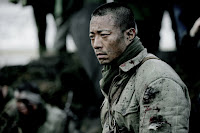 War, what is it good for? On a macro level: closure. In 1950 China, like it or not, the Communists won and the Nationalists lost—period, end of story. However, Red Army Captain Gu Zidi is in desperate need of closure in Assembly, the Chinese epic of war and its personal repercussions, which screened at NYAFF.
War, what is it good for? On a macro level: closure. In 1950 China, like it or not, the Communists won and the Nationalists lost—period, end of story. However, Red Army Captain Gu Zidi is in desperate need of closure in Assembly, the Chinese epic of war and its personal repercussions, which screened at NYAFF.
According to Assembly, there was a huge difference between KIA and MIA in the PLA. If killed in action, a soldier’s family received seven hundred kilos of rice and recognition for a hero’s sacrifice to the revolution. Without a body, they get two hundred kilos and the unspoken stigma of implied desertion. In post-war years, that distinction will haunt Gu, pushing him to the brink of madness.
After serving time in the brig for ordering the execution of unarmed POWs, Gu is reinstated for a suicide mission—covering the retreating PLA from vastly greater Nationalist forces until they hear the bugler call assembly (a plot point important enough to supply the title). As per his instructions, Captain Gu fights to the last man, himself, but his efforts to protect the bodies of his fallen backfires. After loyal service in the civil war and Korea, Gu dedicates himself to fighting the military bureaucracy, hoping to rehabilitate their reputations.
Director Feng Xiaogang does the grit and grime of warfighting quite well. When the bullets and bodies literally fly through the air, Assembly is at its best. However, things get a bit bogged down during its years of post-war angst. Also, when viewers have time to think about the film, some aspects can be a bit troubling, like its favorable view of “political officers” (read ideological enforcers) or Gu’s lack of remorse for his acknowledged war crimes.
There is no question Assembly thinks the right side won in 1950. It is frankly propaganda, but propaganda of an artistic order in the tradition of Battleship Potemkin. Given its unflattering portrayal of the post-war military bureaucracy as well as some cold-blooded battlefield decisions of the PLA, Assembly could conceivably find itself out of favor in the future, should power shift in the poliburo. If it can be separated from its ideology, Assembly is an intense war film, that draws you into Gu’s dilemma. Reportedly, Assembly was leading in the vote for the festival audience award, so maybe greater distribution is in its future.
